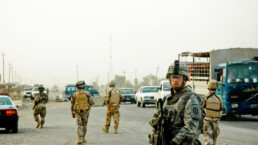Media critic Norman Solomon on how the U.S. media keeps the human consequences of the country’s foreign policy out of view.
Today we speak to Norman Solomon about his new book War Made Invisible: How America Hides the Human Toll of Its Military Machine. Norman is one of the country’s leading progressive media critics. In the book, he talks about how the media helps construct a mental wall between the people of the United States and the victims of U.S. foreign policy. He talks about how the reality of violence is kept from view and how heroic whistleblowers like Chelsea Manning and Daniel Hale are punished when they try to put cracks in the “wall” and show people the reality of their country’s crimes abroad. The interview was conducted by Nathan J. Robinson and appeared originally on the Current Affairs podcast. It has been lightly edited for grammar and clarity.

Nathan J. Robinson:
I want to begin by quoting a paragraph that stood out to me in your introduction:
“Patterns of convenient silence and deceptive messaging are as necessary for perpetual war as the Pentagon’s bombs and missiles, patterns so familiar that they’re apt to seem normal, even natural. But the uninformed consent of the governed is a perverse and hollow kind of consent. While short on genuine democracy, the process is long on fueling a constant state of war. To activate a more democratic process will require lifting of the fog that obscures the actual dynamics of militarism far away and close to home. To lift that fog, we need to recognize evasions and decode messages that are routine every day in the United States.”
I liked that paragraph because it captured a lot of the themes that run through War Made Invisible, one of which appears to be this connection between democracy and knowledge. That is to say, in a system where supposedly the voters are entrusted with holding power to account and have to decide who will be in charge, they can’t make those decisions well if things that are really important are, as your title puts it, made invisible.
Recent Posts
These Veterans Starved Themselves To Protest The War In Gaza
July 8, 2025
Take Action Now As food in Gaza becomes increasingly scarce, activists are pushing their bodies to the limit in solidarity.By Emmet Fraizer, The…
ICE Agents Are Terrorizing Los Angeles With Brutal Tactics
July 8, 2025
Take Action Now ICE agents have established a pattern of brutal use of force in immigration raids.By Jonah Valdez, The InterceptSince June 6,…
Talk World Radio: India Walton On Zohran Mamdani And Freezing Out ICE
July 7, 2025
Take Action Now India Walton, former Democrat nominee for mayor of Buffalo, NY, discusses Zohran Mamdani and the race for NYC mayor and how to deal…
How Climate Change Is Worsening Flooding And Heavy Rainfall
July 7, 2025
Take Action Now The latest science on the link between climate change and natural disasters — and how they may be playing out where you live.By…




